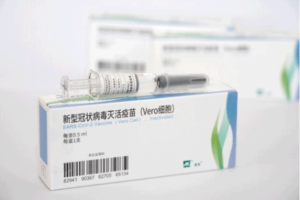
A new study published in The Lancet on Thursday found that an inactivated vaccine candidate, called BBIBP-CorV, was safe and provoked an immune response in healthy individuals. This is the first study of an inactivated COVID-19 vaccine to include participants over 60 years of age.
The BBIBP-CorV vaccine is being developed by the Beijing Institute of Biological Products and Sinopharm in China. The vaccine candidate was based on a sample of the virus isolated from an infected patient, then chemically inactivated and mixed with aluminium hydroxide to boost immune responses.
Inactivated virus vaccines use technology and mechanisms that many existing vaccines use, including measles and polio vaccines. The virus is modified and rendered uninfectious. Inactivated vaccines cannot replicate, so they typically require multiple doses and large quantities of infectious virus are needed to develop inactivated vaccines.

A previous clinical trial for an inactivated SARS-CoV2 vaccine – designed by the Wuhan Institute of Biological Products Co Ltd – published its Phase 1 and 2 results in August in JAMA, but the trial did not include participants over the age of 60. The study reported results similar to those of Sinopharm’s BBIBP-CorV vaccine, with low rates of adverse reactions and high levels of detectable neutralizing antibody responses in the majority of participants. However, the study was limited by its lack of inclusion and analysis of participants who are 60 years or older, the group at higher risk of serious illness.
Phases 1 and 2 of the Sinopharm clinical trial included participants from 18 to 80 years of age with no underlying conditions. The vaccine was given in two-doses. A small proportion of participants reported side effects of pain at the injection site and fever, however all adverse events were either mild or moderate in severity, according to the study results.
Neutralizing antibody responses – which in principle would also be protective against the actual SARS-CoV-2 virus – were induced in all trial participants who received the vaccine. Antibodies were detected at 28 days in participants aged 18-59, and over 75 percent of participants in the 18-59 age group had detectable antibodies after the first dose. But it took two doses and a total of 42 days for all of the participants aged 60-80 to show detectable levels of neutralizing antibodies. Not only did the immune response take longer to develop in participants over 60 years of age, but antibody levels were comparatively lower than in the younger age group.
“Protecting older people is a key aim of a successful COVID-19 vaccine as this age group is at greater risk of severe illness from the disease,” said Xiaoming Yang, one of the authors of the study. “It is therefore encouraging to see that BBIBP-CorV induces antibody responses in people aged 60 and older, and we believe this justifies further investigation.”
The results also suggested that a booster shot would generate the greatest antibody response against SARS-CoV2. Phase 3 of the clinical trial will examine the safety and immunization dose and schedule of the vaccine, as well as extending the follow-up period after the two vaccinations.
With 42 candidate vaccines in clinical trials and 151 in preclinical evaluation, the landscape of potential COVID-19 candidate vaccines is crowded and diverse in vaccine type. Some experts have raised concerns about the ability of inactivated SARS-CoV2 vaccines to induce and maintain protective immunity for infection.
“Because the correlates of protection afforded by inactivated SARS-CoV2 vaccines are yet to be identified, the results of a phase 3 trial of BBIBP-CorV vaccine…will provide information on whether this vaccine is safe and efficacious against SARS-CoV2 infection, and for how long the protective effect is maintained,” said Irina Isakova-Sivak and Larisa Rudenko in a review of the study.
Image Credits: Sinopharm, WHO.
[huge_it_slider id=”15″]
